Few people would claim that Taiwan is an ideal destination for travelers who suffer from impaired mobility. Ramps have been added to every major museum and hundreds of temples, and spacious elevators retrofitted to most railway stations, but getting from A to B in an urban environment is sometimes akin to tackling an obstacle course. Pedestrians are forced to weave between vendors and parked motorcycles — annoying if you’re able-bodied, but nearly impossible if you’re confined to a wheelchair.
Taiwanese certified as physically or mentally disabled, and those who travel with them, are entitled to 50 percent discounts on most bus and train tickets. However, neither Taiwan High Speed Rail nor Taiwan Railway Administration extend such concessions to foreign visitors, or to foreign nationals who live and pay taxes here. Taiwan is not unique in doing this. Wheelchair-bound travelers buying train tickets in Japan have been dismayed to learn that obvious disability backed by documents from their home countries doesn’t entitle them to any discounts.
Nevertheless, physically-challenged travelers have succeeded in touring Taiwan and enjoying the experience. One of them is Jennifer Messner, an American who spent 10 days here in spring last year.
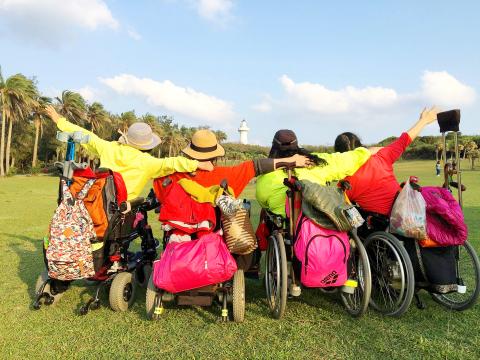
Photo Courtesy of Infinitaiwan
Messner, who by her own description “cannot walk a single step,” traveled with two able-bodied companions. “That made all the difference. I’m small enough that my friends could lift me in and out of taxis. But when we planned the trip, we didn’t find many wheelchair-friendly hotels. In one B&B, my friend had to put a plastic chair in the shower, help me into it, and then help me out after I’d washed,” she recalls.
ACCESSIBILITY
Facilities for the disabled have certainly improved in the past decade. A key reason for this is that, as Taiwan’s population ages and its citizens become more aware of the rights of the disabled, central and local government agencies have endeavored to make the places under their control more accessible.
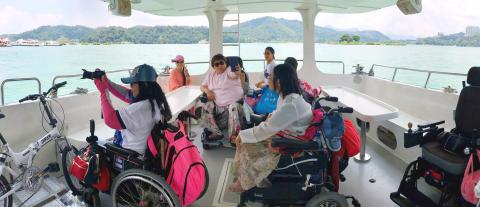
Photo Courtesy of Infinitaiwan
They’re also trying to let the world know about such improvements. A bilingual leaflet produced by the Tourism Bureau’s East Coast National Scenic Area Administration (東部海岸國家風景區管理處) shows the location of every wheelchair ramp, barrier-free bathroom and accessible observation platform at the Amis Folk Center (阿美民俗中心), Taitung’s Jialulan (加路藍) and Shiauyeliou (小野柳). In English, Chinese and Japanese, the scenic area’s Web site outlines a day-long itinerary suitable for the physically challenged, as well as a two-day plan for “silver-haired tourists.”
According to the Taipei City Government Web site, 90 percent of the capital’s public buses will be low-floor vehicles by 2020. Tourists in wheelchairs can now explore parts of Yangmingshan National Park, the 1.7km-long Erzihping Trail (二子坪步道) being described as the park’s only barrier-free path. Yet the designers of at least one new facility made no effort to accommodate those who have a physical disability. The Web site of the Old Mountain Line Rail Bike (舊山線鐵道自行車), an attraction in Miaoli County’s Sanyi Township into which tens of millions of taxpayer dollars were reportedly poured, is succinct: “Differently-abled people are forbidden to take the ride.”
‘WHEELCHAIR-FRIENDLY TOURS’
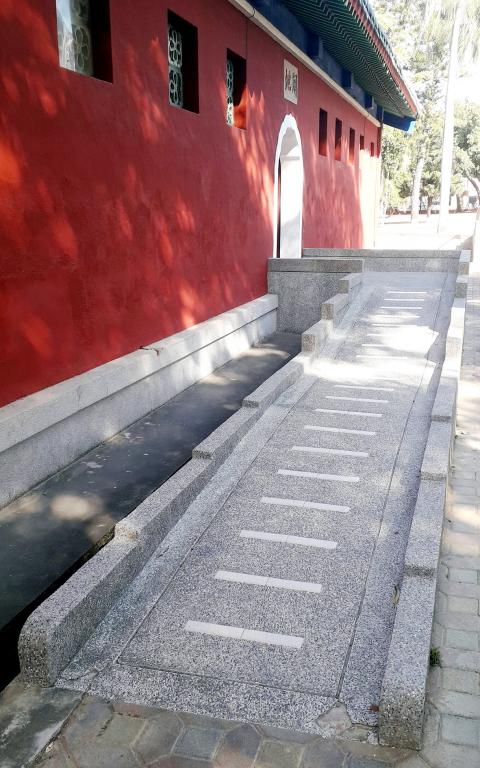
Photo: Steven Crook
Topology Travel is perhaps the only Taiwan-based tour company currently promoting “wheelchair-friendly tours” to international visitors. Since the company was established in 2011, it has guided more than 15 groups of disabled visitors around Taiwan.
“Most government-run tourist attractions are required to have facilities for the disabled. Not all are good quality, but of course something is better than nothing,” says Peter Lin (林文攀), Topology’s sales director.
Lin says the National Palace Museum, Chiang Kai-shek Memorial Hall, Yehliu Geopark and the Gold Museum in New Taipei City’s Jinguashi are among Taiwan’s most accessible attractions. In addition to certain sites in northern Taiwan, he praises the facilities at Wuling Farm (武陵農場) in the mountains of central Taiwan, and at Chimei Museum (奇美博物館) in Tainan.
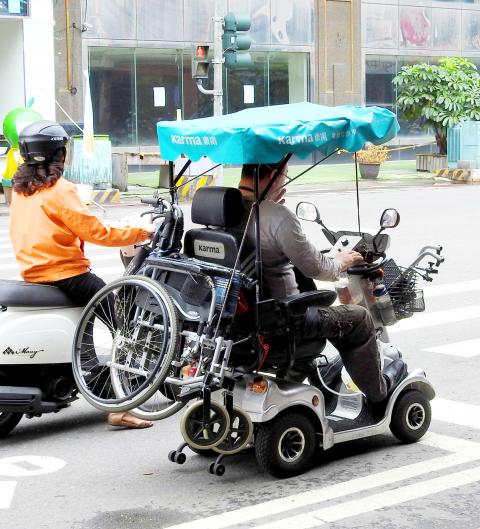
Photo: Steven Crook
Lin says that hotels in Taiwan are required by law to have at least one wheelchair-friendly room if the number of guest-rooms is 50 or greater. However, disabled activists have complained that in some hotels, accessible guest-rooms have been illegally converted for storage or other purposes, and are unavailable when wheelchair-bound travelers need them.
Within the private sector, a few entrepreneurs have realized that wheelchair-users — around 1 percent of the population — represent an important market. Among them are the owners of Sincere Friendly B&B, a licensed six-room guesthouse in Taitung City. In addition to ramps, it has parking spaces large enough for the minibuses which many of the disabled need to get around.
“That guest house has great facilities for disabled people,” says Lin. He also praises the efforts of Infinitaiwan, a niche tour company that takes disabled Taiwanese tourists abroad and helps physically challenged foreign visitors travel around Taiwan.
A pleasure-boat owner at Sun Moon Lake has adapted one of his vessels for wheelchairs users. However, Lin says, “it has to be booked well in advance, because the owner has to organize a crew that can help the group get on and off safely.”
OUTLYING ISLANDS
Physically challenged travelers hoping to visit Taiwan’s outlying islands are sometimes out of luck. According to the Web site of the Taiwan Accessible Tourism Center (TATC, 台灣無障礙旅遊資訊網), several of the boats which sail to Penghu and Pingtung County’s Siaoliouciou Island (小琉球) are accessible to those in wheelchairs. Some of these vessels lack barrier-free bathrooms, however, and on a few the narrowest corridor is a mere 60cm across — a detail of great significance to wheelchair users, who generally require walkways 90cm wide, and a minimum of 1.5m if they’re to comfortably make a complete turn.
Lin thinks there aren’t enough spaces for physically challenged passengers on Taiwan’s high-speed trains.
“Each train has just four special seats, but disabled people usually will travel together because they need to help each other,” he says.
TATC has assessed more than 250 tourist destinations around Taiwan from the perspective of disabled travelers and posted its findings at www.taiwan-accessible.com.tw. According to these reviews, the Old Railway Culture & Business District (舊鐵道文化商圈) in the heart of Hualien City has parking spaces reserved for disabled visitors, and wheelchair ramps, but lacks barrier-free toilets. The situation is very similar at both Sankeng Old Street (三坑老街) in Taoyuan’s Longtan District (龍潭 ) and Gukeng Green Tunnel (古坑綠色隧道) in Yunlin County.
Physically challenged people often complain about having to limit their fluid intake when venturing far from home.
“Back in Illinois, I never worry about dehydration,” says Messner. “But in warmer places like Taiwan, hardly drinking water when you’re outside is uncomfortable and potentially unsafe.”
Steven Crook has been writing about travel, culture, and business in Taiwan since 1996. Having recently co-authored A Culinary History of Taipei: Beyond Pork and Ponlai, he is now updating Taiwan: The Bradt Travel Guide.
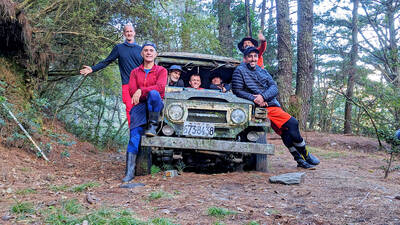
The year was 1991. A Toyota Land Cruiser set out on a 67km journey up the Junda Forest Road (郡大林道) toward an old loggers’ camp, at which point the hikers inside would get out and begin their ascent of Jade Mountain (玉山). Little did they know, they would be the last group of hikers to ever enjoy this shortcut into the mountains. An approaching typhoon soon wiped out the road behind them, trapping the vehicle on the mountain and forever changing the approach to Jade Mountain. THE CONTEMPORARY ROUTE Nowadays, the approach to Jade Mountain from the north side takes an

Relations between Taiwan and the Czech Republic have flourished in recent years. However, not everyone is pleased about the growing friendship between the two countries. Last month, an incident involving a Chinese diplomat tailing the car of vice president-elect Hsiao Bi-khim (蕭美琴) in Prague, drew public attention to the People’s Republic of China’s (PRC) operations to undermine Taiwan overseas. The trip was not Hsiao’s first visit to the Central European country. It was meant to be low-key, a chance to meet with local academics and politicians, until her police escort noticed a car was tailing her through the Czech capital. The

Last week Joseph Nye, the well-known China scholar, wrote on the Australian Strategic Policy Institute’s website about how war over Taiwan might be averted. He noted that years ago he was on a team that met with then-president Chen Shui-bian (陳水扁), “whose previous ‘unofficial’ visit to the US had caused a crisis in which China fired missiles into the sea and the US deployed carriers off the coast of Taiwan.” Yes, that’s right, mighty Chen caused that crisis all by himself. Neither the US nor the People’s Republic of China (PRC) exercised any agency. Nye then nostalgically invoked the comical specter

April 15 to April 21 Yang Kui (楊逵) was horrified as he drove past trucks, oxcarts and trolleys loaded with coffins on his way to Tuntzechiao (屯子腳), which he heard had been completely destroyed. The friend he came to check on was safe, but most residents were suffering in the town hit the hardest by the 7.1-magnitude Hsinchu-Taichung Earthquake on April 21, 1935. It remains the deadliest in Taiwan’s recorded history, claiming around 3,300 lives and injuring nearly 12,000. The disaster completely flattened roughly 18,000 houses and damaged countless more. The social activist and